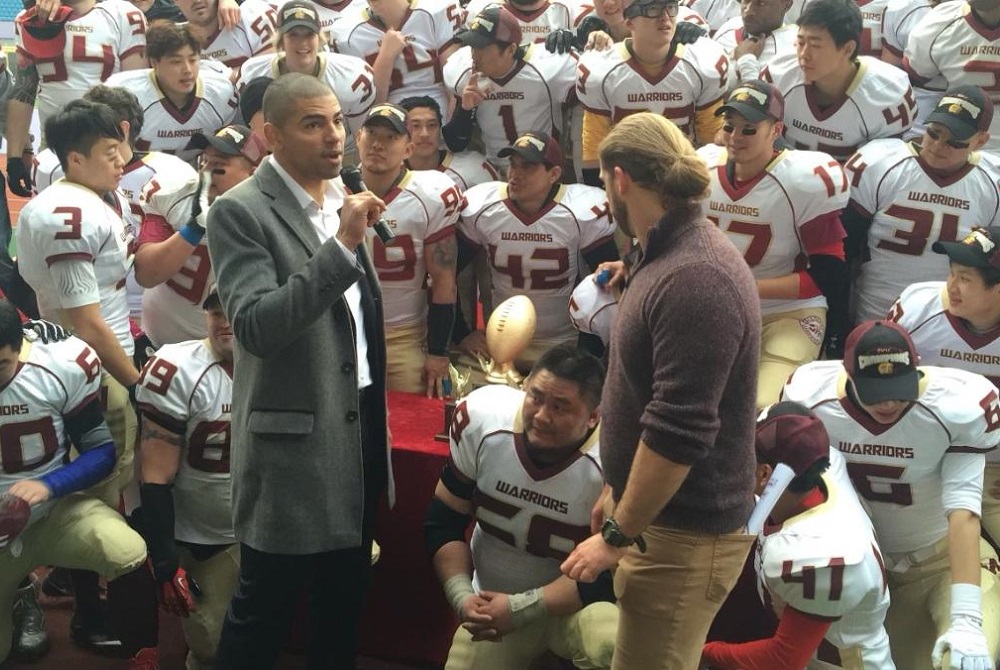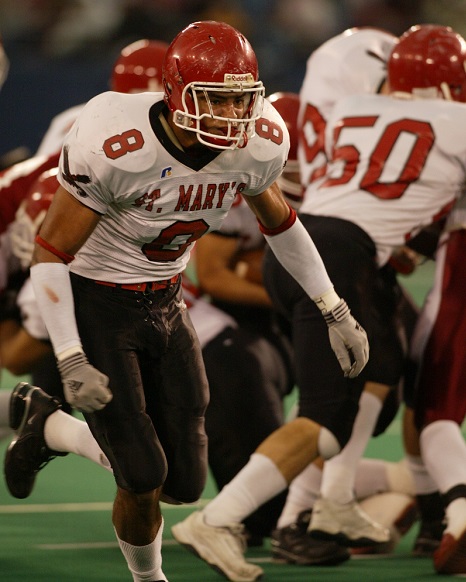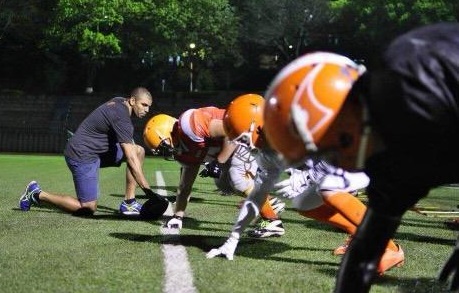
Sailors Eye 'Their Turn' after QB Moves On
August 25, 2015
By Dean Holzwarth
Special for Second Half
CUTLERVILLE – With the 2015 season opener against Grand Rapids Christian a few days away, South Christian football coach Mark Tamminga said quarterback isn’t a position that's stressing him out.
That statement might be a bit surprising considering Tamminga graduated this spring one of the most prolific passers in Michigan High School Athletic Association history.
 Jon Wassink capped a banner high school career last fall by guiding the Sailors to a Division 4 championship with a dramatic 28-27 win over Lansing Sexton.
Jon Wassink capped a banner high school career last fall by guiding the Sailors to a Division 4 championship with a dramatic 28-27 win over Lansing Sexton.
Wassink, a three-year starter, took his talents to Western Michigan University, but not before finishing second all-time in the MHSAA record book for career passing yards with 8,124.
In fact, Wassink’s name appears in the MHSAA record book 17 times despite playing only three varsity seasons. He’s third in career passing attempts (884), second in completions (584) and fifth in touchdown passes (76).
“We’re never going to replace a Jon Wassink; there’s no doubt about that,” Tamminga said after practice last week. “But I have two kids right now fighting for the quarterback position, and whichever one gets the job is going to be a very good high school quarterback. Maybe an all-conference quarterback, I’m not sure, but the quarterback position right now is pretty far down on my worry list.
“We have other things to worry about. Our line, our receivers, but we’re going to be fine with our quarterback. We’re going to score some points.”
Besides Wassink, the Sailors graduated a bevy of talent from a senior class that won 12 straight games after an 0-2 start to win their second MHSAA Final in three seasons.
Eighteen starters are gone, leaving behind a young team stacked with juniors and sophomores.
The only remaining starters are seniors Ezinga, Niewiek, John Masselink (TE/S) and Dylan Brink (RB/LB).
“We lost a great senior class, all the way down,” Tamminga said. “They were such great leaders, and the kids rallied around them. I told this year’s group that it’s their turn. They have to step up. You can win games with underclassmen, but to win consistently you have to have senior leadership, and that’s what I need from those guys. So far they have shown that, and we’re pretty proud of them.”
The person attempting to fill the void left by Wassink was yet to be determined at the start of this week. Junior Eric Dykstra and sophomore Andrew Haan are vying for the starting position.
Dykstra is the frontrunner, but recently suffered a wrist injury. That allowed Haan to take a majority of reps in practice and during the Sailors’ preseason scrimmage.
Tamminga said both have the potential to step in and lead this year’s squad.
“I would say Eric has the upper hand if healthy, but it is so close,” he said. “We don’t lose a beat with Andrew in there either. Both of them realize they have big shoes to fill, but what is so great is they don’t feel they have to be the next Jonny Wassink. They are going to be them, and they are going to be very good high school quarterbacks.”
 South Christian also will miss Wassink’s ability to run the ball. He rushed for 3,252 yards and 50 touchdowns in three seasons.
South Christian also will miss Wassink’s ability to run the ball. He rushed for 3,252 yards and 50 touchdowns in three seasons.
“He definitely made big plays with his arm and his legs, which I think is going to hurt us the most,” Sailors’ right guard Josh Ezinga said. “He was such a two-dimensional player that defenses had to either prepare for him running-wise or passing-wise.
“And even though as a lineman you try not to miss a block, it happens once in a while, and he would just make a play and make you look like you’re the best in the world because he would make people miss.”
The absence of Wassink will be felt from a leadership standpoint as well. He wasn’t only a playmaker, he was there to help the younger players improve.
“Obviously Jon was a great player, but he also was a great leader,” senior wide receiver Jake Niewiek said. “He helped me a lot when I was getting started with the offense. Being a receiver in the system was a little complicated, but he really took us under his wing and showed us what we had to do.”
But Tamminga said adjustments have been made to atone for Wassink not being on the field in 2015.
“We basically had it pretty easy when he was here, and now we have to step up and coach to our strengths,” he said. “You have to coach differently because Jonny was like having another coach on the field. These kids are not going to be able to do the things that Jonny did. We have to adjust as coaches to compensate for that.”
The key losses by the Sailors have other teams chomping at the bit to dethrone the two-time Ottawa-Kent Gold champions.
But while others may deem this a down year, South Christian hopes to maintain the same tradition of winning to which it has become accustomed.
“I think there are different expectations for us from the public and the media, but I think all the pieces of the puzzle are there and we can still be a great team this year,” Ezinga said. “I definitely think we can win with sophomores and juniors, and they realize they have to go hard every single play.”
Niewiek agreed that this year’s team can still be a formidable challenger.
“Practices have been great and everyone has been working their butts off,” he said. “We obviously have lower expectations than last year, but we hope to surprise some people. We want to keep the bar set high.”
Tamminga said the first goal is to get to six wins, which won’t be easy with three straight playoff teams on the schedule to open the season.
“We want to make the playoffs,” he said. “Just make the playoffs, but what worries me is if we don’t have three good games and go 0-3. I still believe we can go 6-3 and make the playoffs. They have to believe it, and that’s the challenge ahead of us right now.”
 Dean Holzwarth covered primarily high school sports for the Grand Rapids Press and MLive for 16 years and more recently served as sports editor of the Ionia Sentinel and as a sports photojournalist for WZZM. Contact him at [email protected] with story ideas for Allegan, Kent and Ottawa counties.
Dean Holzwarth covered primarily high school sports for the Grand Rapids Press and MLive for 16 years and more recently served as sports editor of the Ionia Sentinel and as a sports photojournalist for WZZM. Contact him at [email protected] with story ideas for Allegan, Kent and Ottawa counties.
PHOTOS: (Top) South Christian’s Jake Niewiek celebrates a turnover during last season’s Division 4 Final at Ford Field. (Middle) The Sailors’ Jake Elzinga works to stay in front of a Sexton ball carrier; both he and Niewiek return this fall.

St. Mary's Standout McLaurin Becomes Chinese Football Pioneer
By
Tom Markowski
Special for Second Half
August 19, 2021
The eight years Chris McLaurin spent in China not only changed his life, but they changed the perception of American football in China and elsewhere – and just may have opened the door to a whole new market.
 We're talking “American football,” not soccer. Most of us are familiar with NFL Europe, but NFL China? Not so much.
We're talking “American football,” not soccer. Most of us are familiar with NFL Europe, but NFL China? Not so much.
When McLaurin went to China in 2011, the thought of teaching the locals American football never occurred to him. He went there to work for a private company, and circumstances just seemed to fall in place.
Some might say McLaurin was in the right place at the right time, but it can also be said he was the right person at the right time to lead this undertaking. McLaurin had the background, both athletically and organizationally, to take on such an endeavor.
“I met a lot of people who were interested in football,” McLaurin said. “I thought, football? I had a limited understanding of what they knew. I was very surprised they would reach out to me. I quickly found out they were hungry to learn.”
A 2005 graduate of Orchard Lake St. Mary's, McLaurin started at tight end and linebacker, and helped the Eaglets reach the MHSAA Division 2 Final in 2004 (where they lost to Muskegon). McLaurin went on to play four seasons at Michigan and graduated in 2009 with a degree in history and minor in urban and community studies. He had thoughts of entering law school when other opportunities interceded.
During his time in Ann Arbor, McLaurin worked with an organization that focused on disadvantaged youth in the area and helped open doors for them. They were allowed to attend lectures at the university as well as sporting events.
Upon graduation, the seeds that would blossom in Asia began being sown in other parts of the world.
McLaurin received a Fulbright Scholarship and went to Johannesburg, South Africa, to work with underprivileged youth as part of a program called Tomorrow Trust. During this time he worked with the United Nations Development Programme and Harvard Law School in their pursuit of promoting economic rights for the poor.
Following his work in South Africa, McLaurin began his post-graduate work at the London School of Economics. He earned his degree after working in the House of Commons and as a research assistant for the Runnymede Trust. Then came a six-month internship within the Obama Administration as part of the White House Domestic Policy Council.
And after that, he was off to Chongqing in western China to work for a private equity company as a project manager. Two years later, he started his own company in addition to a non-profit organization. Much of his work centered on the automobile industry and global technology.
During this time he learned to speak Mandarin and, in doing so, was introduced to more of the local customs – including American football.
 What McLaurin found was a rudimental brand of football, what we would term a recreational type of competition. McLaurin began his involvement gradually, on weekends.
What McLaurin found was a rudimental brand of football, what we would term a recreational type of competition. McLaurin began his involvement gradually, on weekends.
“After that first year (2012), I took it up a notch,” McLaurin said. “We started recruiting players and bought new equipment. They watched football on TV, but it's not an easy game to understand. You have to play football to learn it. You don't get that from watching TV.”
A year of training, recruiting and, yes, some frustration, led McLaurin to start a league, the American Football League of China (now known as the China National Football League). The rules are similar to those at the U.S. college level. There are 11 players a side, and when a ball carrier's knee touches the ground the play is over.
In the beginning “it was successful,” he said. “There were no leagues when I got there. There was no one to organize it. We went from (fewer than) 10 teams to, 3-to-4 years later, there are 80-90.”
McLaurin quickly learned he needed help if this adventure was to succeed. USA Football had a footprint in Shanghai, and McLaurin reached out to the organization. McLaurin contacted a handful of former teammates including Prescott Burgess and Morgan Trent for advice. Former NFL player Bruce Plummer and NFL coach and scout Jerry Hardaway worked some of the camps and clinics with McLaurin and added much-needed experience and expertise.
After playing at Southern Illinois, Hardaway’s first coaching position was at Memphis State as an assistant, and then he went to Grambling State to coach under the legendary Eddie Robison for six seasons. He also coached at the University of California under Joe Kapp prior to working in the NFL and then heading to China.
“I was told, through another guy, that (McLaurin) needed some help,” Hardaway said. “It was all about getting back to basics. That's what made it fun. They had no clue when you'd say to them, control the ground at impact when you're making a block. They had no idea of the terms that you'd use. To see the young kids, to see on their faces, they were absorbing everything.
 “Yes, yes, yes, it was worthwhile. First of all, people had no clue about what it takes to do something like this. They were learning. Some of the parents thought it was a violent sport. That's what they heard. Then they switched. They saw me, us, teach the basics and they saw what we were doing. For me, it gave me a sense, like hey, you have to teach and you have to enjoy it.”
“Yes, yes, yes, it was worthwhile. First of all, people had no clue about what it takes to do something like this. They were learning. Some of the parents thought it was a violent sport. That's what they heard. Then they switched. They saw me, us, teach the basics and they saw what we were doing. For me, it gave me a sense, like hey, you have to teach and you have to enjoy it.”
Soon after that first season, the NFL got involved as did the National Committee on United States - China Relations. McLaurin credits the NFL for advising him on the business end of starting a new league and structuring. After 18 months, McLaurin got out of coaching and became the commissioner.
“(The NFL) wanted to expand,” he said. “They saw how their brand was quite low (in China). China is a natural.”
Progress was slow, but it was still progress. The 2015 championship game was played in Shanghai, and McLaurin estimates it drew 3,500 spectators.
He continued to work with the AFLC through 2019 but then decided to make a career move. He returned to the U.S. and, this fall, is pursuing a dream he's held since leaving U-M. At age 34, McLaurin entered Harvard Law School.
“When I started, the last thing we wanted was a U.S. version of football,” he said. “We wanted it to be Chinese football. There were limitations on how many foreigners would compete. At first it was five (per team), then three. We wanted it to be a Chinese experience."
2020-21 Made in Michigan
August 5: Herremans' Focus on 'Dadding,' Giving Kids Similar Small-Town Childhood - Read
July 29: Loy Norrix Career Prepped Crocker for U-M Success, Law Degree Pursuit - Read
July 19: Top PGA Pro Finish Latest Greatest Highlight as Cook Continues Climb - Read
July 16: TC West Standout Renews Ties to Titans, Cheers Past Teammates' Gold Pursuit - Read
July 8: Caro Champs Find Common Ground Again as Mental Health Providers - Read
June 28: Michigan's Minor Leaguers Making Up for Lost Season - Read
PHOTOS: (Top) Former Orchard Lake St. Mary's standout Chris McLaurin started an American football league in China and remained part of its leadership through 2019. (Middle) McLaurin was a two-way starter for St. Mary's 2004 Division 2 runner-up team. (Below) McLaurin runs drills for one of the Chinese teams. (Top and below photos courtesy of Chris McLaurin; middle photo from MHSAA archives.)

